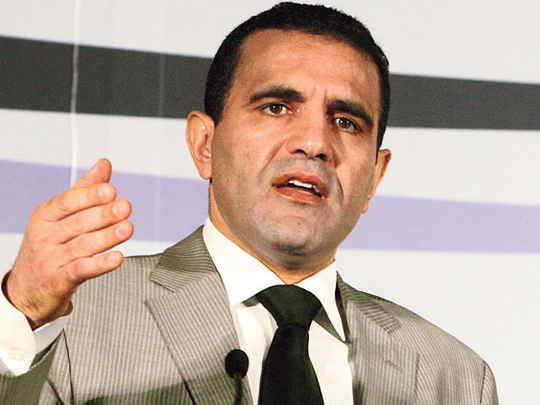
Dubai: When it comes to foreign investments, Libyan Investment Minister Jamal Ellamushe says Libya is not just a cake for investors to share.
Indeed, it is a factory that produces all types of sweets, he said.
The oil-rich North African country until recently adopted socialist economic principles and was hit with harsh economic sanctions for nearly 10 years — from the 1990s until 2003.
Today the country is seeking to promote itself as an emerging hub for investors worldwide.
Its efforts appear to be bearing fruit.
The country has much to offer, including the administration of some of the eight seaports on the nearly 2000km coast.
It also offers an under-construction international airport with a capacity of 20 million passengers a year, the minister said.
Speaking to Gulf News in an exclusive interview in Dubai where he chaired a forum designed to promote investment in Libya, Ellamushe said that since the sanctions were lifted, the "world started looking at Libya as a country with promising investment opportunities.
"Anybody who misses the opportunity of investing in Libya at present is considered a loser from an economic point of view," he said.
"Libya has the needed raw materials and sufficient human resources, where nearly 65 per cent of its population is under 35 years old, and this makes it a strong, emerging, promising human-power that is capable of building a very strong economy," Ellamushe said.
Foreign investments in Libya currently stand at nearly 21 billion Libyan dinars, and the investment minister said he preferred not to reveal the target of foreign investments Tripoli was seeking to attract in the near future.
Italy at the top
Italy tops the list of foreign investors, official figures show.
American companies are also among foreign investors in Libyan refineries.
According to Ellamushe, American companies had an investment of nearly $7 billion (Dh26 billion) in one oil refinery and discussions were underway to invest in another $5 billion project, he said.
Libya's geographic location — connecting three big continents with different sources and needs (Europe, Africa and Asia) — added to the advantages of the country, he said.
"We have also started thinking of the era after the oil runs out within several years from now…. but we have drawn our priorities," Ellamushe said.
When it came to Libya's priorities and investment opportunities, the nation currently produced nearly two million of oil barrels a day, he said.
While development of the education and health sectors was high among present priorities, Libya is also seeking to attract more investments in the renewable energy field, he said.
"And the Germans are among the first people waiting the right moment to jump in and invest in that field in Libya," Ellamushe said.
Libya was spending hundreds of millions of dollars to send Libyan students to pursue their higher education abroad every year as part of a programme to build a qualified, strong human resource base, he said.
In addition, almost one million Libyans are travelling to neighbouring Tun-isia for treatment due to the lack of medical services at home, the minister noted.
Tripoli said earlier this year it had allocated money for a three-year "industrialisation development programme 2010-1013 totalling 3.3 billion Libyan dinars," Libyan media have reported.
Ellamushe said the country would continue to allocate a significant amount to develop its infrastructure.
Comprehensive
"It is a comprehensive development programme that will be implemented in phases.
"Libya has done all it can do in 2009 and 2010 to amend the needed laws," he said, referring to laws for investments, taxes, labour and trade laws and regulations.
While the investment laws treat both Libyan and foreign investors equally when it comes to rights and responsibilities, the tax law offers a tax and customs holiday to investors for the first five years, the minister said.
Trade regulations ban monopolies.
The size of the Libyan market was another attraction for investors, he added.












